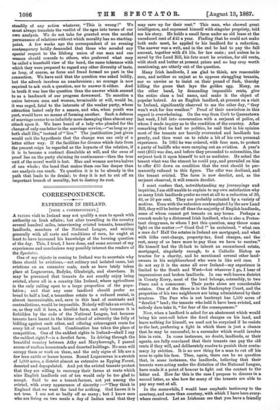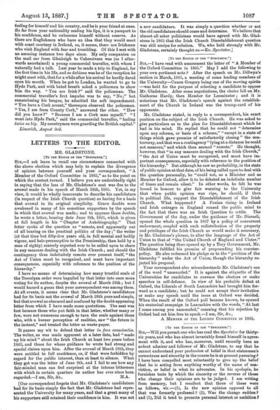CORRESPONDENCE.
EXPERIENCE IN IRELAND.
[rnors A CORRESPONDENT.] A PLYING visit to Ireland may not qualify a man to speak with authority op Irish affairs; but after travelling in the country several hundred miles, interviewing evicted tenants, tenantless landlords, members of the National League, and mixing generally with all sorts and conditions of men, he ought at least to have increased his knowledge of the burning question of the day. This, I trust, I have done, and some account of my experiences and conclusions may possibly interest the readers of the Spectator.
One of my objects in coming to Ireland was to ascertain why there should be evictions,—not solitary and isolated cases, but evictions on an extensive scale, such as have lately taken place at Lugacurran, Bodyke, Glenbeigh, and elsewhere. It may be presumed that tenants do not exactly enjoy being evicted, above all in a country like Ireland, where agriculture is the only calling open to a large proportion of the popu- lation ; and that any sane landlord should prefer no bread to half a loaf, a tenantless estate to a reduced rental, is almost inconceivable, and, save in this land of contrasts and contradictions, would be impossible. Nobody will take an evicted, or, as they call it here, a derelict farm, not only because it is forbidden by the code of the National League, but because tenants have learnt in the bitter school of adversity the folly of bidding against each other, and offering extravagant rents for every bit of vacant land. Combination has taken the place of competition. One of the saddest sights in Ireland—shall I say the saddest sight P—is a derelict farm. In driving through the beautiful country between Athy and Maryborough, I passed scores of roofless homesteads and deserted holdings. No man will occupy them or work on them, and the only signs of life are a few lean cattle or leaner horses. Round Lugacurran is a stretch of 5,000 acres, a district almost as extensive as Epping Forest, deserted and depopulated. And yet the evicted tenants protest that they are willing to reoccupy their farms at rents which nine English landlords out of ten would only be too glad to accept Said to me a tenant-farmer, not yet among the evicted, with every appearance of sincerity :—" They think in England that we want the land for nothing. God knows it is not true. I am not as badly off as many ; but I know men who are living on two meals a day of Indian meal that they may save up for their rent." This man, who showed great intelligence, and expressed himself with singular propriety, told me his story. He holds a small farm under an old lease at the unreduced rent of 242 a year. Finding that he could not make both ends meet, he applied to his landlord for a reduction. The answer was a writ, and in the end he had to pay the talk amount, together with Xi 10s. for law costs ; and unless he is saved by the Land Bill, his fate must be eviction, for old rents,. with stock and butter at present prices and no hay crop wortls mentioning, are utterly out of the question.
Many Irish landlords, I am glad to think, are reasonable. men, and neither so unjust as to oppress struggling tenants, nor so unwise as to insist on their pound of flesh, thereby killing the goose that lays the golden egg. Many, on the other hand, by demanding impossible rents, give the entire class a bad name, and make it the object of popular hatred. As an English landlord, at present on a visit to Ireland, significantly observed to me the other day, "they won't wait for fine weather." Proof of their unwisdom in this regard is overwhelming. On the way from Cork to Qaeenstown last week, I fell into conversation with a serjeaut of police, of whom I made inquiry as to the condition of the country. After- remarking that he had no politics, he said that in his opinion most of the tenants are heavily overrented and landlords too. greedy, and then went on to relate a bit of his own personal. experience. In lx 5 he was ordered, with four men, to protect a party of bailiffs who were carrying out an eviction. A year's rent (265) was due, and before they proceeded to extremities, the serjeant took it upon himself to act as mediator. He asked the tenant what was the utmost he could pay, and prevailed on him to offer 250 down on condition that the rent should be per- manently reduced to this figure. The offer was declined, and the tenant evicted. The farm is now derelict, and, as the eerjeant observed, it will remain derelict.
I must confess that, notwithstanding my journeyings and, inquiries, lam still unable to explain to my own satisfaction why so many Irish landlords prefer no rent at all to a reduction of SO,. 40, or 50 per cent They are probably actuated by a variety of motives. Even with the reduction contemplated by the new Land Bill, they will be better off than the majority of English landlords,, some of whom cannot get tenants on any terms. Perhaps a, remark made by a distressed Irish landlord, who is also a Protes- tant clergyman, to whom I Out this question, may throw some light on the matter,—" Good God !" he exclaimed, "what can a man do P Half the estates in Ireland are mortgaged, and what with tithe rent-charge, property-tax, fixed charges, and the- reat, many of us have more to pay than we have to receive?' He himself had the ill-lack to inherit an encumbered estate, mortgaged, singularly enough, to a Catholic Bishop as. trustee for a charity, and he mentioned several other land- owners in his neighbourhood who were in like evil case. I do not say it is the same all over Ireland—my experience is limited to the South and West—but wherever I go, I hear of impecunious and broken landlords. In one well-known district in County Kerry, most of the land belongs, ostensibly, to two Peers and a commoner. Their parks alone are considerable estates. One of the three is in the Bankruptcy Court, and the properties of his two neighbours are being administered by their trustees. The Peer who is not bankrupt has 1,500 acres of " derelict " land; the tenants who held it have been evicted, and nobody dare take it, "for fear of the consequences."
Now, when a landlord is asked for an abatement which would bring his rent-roll below the fixed charges on his land, and. leave nothing for himself, we need not be surprised if he resiets to the last, preferring a fight in which there is just a chance that he may be successful, to a surrender which would involve him in ruin. In some instances, no doubt, landlords, or their agents, are fully convinced that their tenants can pay the old rents if they will, and deliberately resolve to punish their contu- macy ,by eviction. It is no new thing for a man to cut off his- nose to spite his face. Then, again, there can be no questiom that, in some instances, the landlords, believing that their tenants were acting under the dictation of the National League, have made it a point of honour to fight out the contest to the bitter end. How far this is the case I propose to discuss in a, second letter, as also how fax many of the tenants are able to pay any rent at all.
In the meanwhile, I would bear emphatic testimony to the courtesy, and more than courtesy, with whioh I have been every- where received. Let an Irishman see that you have a friendly feeling for himself and his country, and he is your friend at once. 430 far from your nationality sealing his lips, it is a passport to his confidence, and he unbosom himself without reserve, As there are Englishmen who have an idea that they would meet with scant courtesy in Ireland, so, it seems, there are Irishmen who visit England with fear and trembling. Of this I met with an amusing instance two days since. My only companion on the mail car from Glenbeigh to Caherciveen was (as I after- wards ascertained) a young commercial traveller, with whom I naturally had a talk. Last year he made a trip to England, for the first time in his life, and so dubious was he of the reception he might meet with, that for a while after his arrival he hardly dared open his month. When he got to London, he wanted to go to Hyde Park, and with bated breath asked a policeman to show him the way. 'You are Irish P" said the policeman. The Commercial traveller's first impulse was to say, "No ;" but remembering his brogue, he admitted the soft impeachment. " You have a Cork accent," thereupon observed the policeman. "Yes, I am from County Cork," answered the other. "How -did you know P" "Because I am a Cork man myself." "I went into Hyde Park," said the commercial traveller, "feeling twice as big. My countrymen were guarding the British capital."
Limerick, August 3rd.



































 Previous page
Previous page